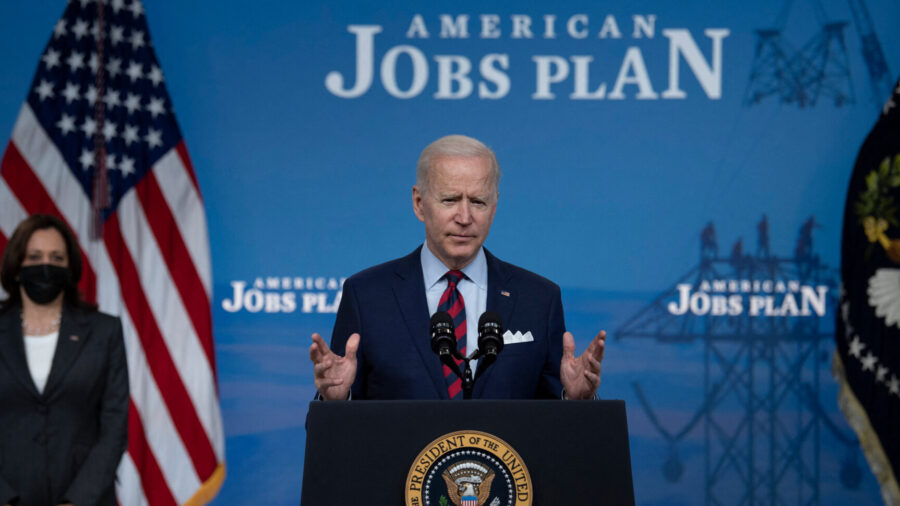President Joe Biden is willing to go lower on his proposed corporate tax rate but is holding firm on a “big” infrastructure plan.
Biden wants to increase the corporate tax rate from 21 percent to 28 percent to help pay for his $2.2 trillion infrastructure proposal.
The president told reporters after giving a speech at the White House in Washington on infrastructure on Wednesday that he’s “wide open” to going lower on the rate.
“But we got to pay for this,” he added. “There’s many other ways we can do it, but I’m willing to negotiate that. I’ve come forward with the best, most rational, way in my view, the fairest way to pay for it. But there are many other ways as well, and I’m open.”
The one exception on ideas Biden will accept is increasing taxes on people making less than $400,000 a year.
Gina Raimondo, Biden’s secretary of commerce, told reporters during a separate briefing that Biden plans to sit down, listen, and engage with Republicans and business leaders, along with Democrats, to hammer out the final details of the infrastructure bill.
“There is room for compromise, that is clear,” she said.
“Our proposal is to invest in eight years and pay back over 15. Now we can have a discussion about that. Should we pay it back over 20 instead of 15? Is the rate not quite 28? Is it something lower? So we want to compromise. What we cannot do and what I am imploring the business community not to do is to say, ‘We don’t like 28. We’re walking away. We’re not discussing.’ That’s unacceptable. Come to the table and problem solve with us to come up with a reasonable, responsible plan.”
Officials also indicated that the administration would not back any proposals that come in too low, such as one floated by Sen. Roy Blunt (R-Mo.) that would cost $615 billion.
Blunt has argued that Biden would have “an easy bipartisan win” if Biden cuts things that have little to do with infrastructure.
“If we’d go back and look at roads and bridges and ports and airports, and maybe even underground water systems and broadband, you’d still be talking about less than 30 percent of this entire package,” Blunt said on “Fox News Sunday.”
“Obviously Democrats have figured out that infrastructure is something we need and something that’s popular, and so they’re trying to take 70 percent of this bill and call it infrastructure in a new way than we’ve ever talked about infrastructure before—and that means you’re looking at another partisan package just like we had with COVID,” he added later.
Raimondo said the administration would hold discussions but warned officials not to “come back and say we only need a half a billion dollars of infrastructure.”
“Because if we do that, we’ll be in the same place or a worse place 10 years from now. So yes, reasonable people can disagree. We’ll find compromise, but let’s go big and let’s do what’s required,” she said.

Biden promised during his campaign to unify the country but has struggled to draw Republican support for his grand idea. Democrats were forced to resort to budget reconciliation to ram through his COVID-19 relief package. The method dropped the number of required votes in the Senate from 60 to 50. Zero Republicans in either chamber backed the bill.
Biden plans to meet with members of Congress when they return to Washington next week, White House press secretary Jen Psaki said Wednesday.
So far, most Republicans have signaled they don’t like Biden’s infrastructure plan, with similar complaints of extraneous spending.
“What the president proposed this week is not an infrastructure bill,” Sen. Roger Wicker (R-Miss.) said Sunday on NBC’s “Meet the Press.”
“It’s a huge tax increase, for one thing. And it’s a tax increase on small businesses, on job creators in the United States of America.”
Senate Minority Leader Mitch McConnell (R-Ky.) told reporters in Kentucky on Wednesday that he could back a smaller plan.
“If we could agree on what the definition of infrastructure is—and I think it clearly must include roads and bridges and broadband—there may be a way forward. But it needs to be credibly paid for, not through completely revisiting the tax reform act of 2017,” he said.
The 2017 bill, signed by then-President Donald Trump, cut corporate tax rates by 15 percent and lowered taxes for most households.
Sen. Shelley Moore Capito (R-W.Va.) said recently on Capitol Hill that she wants to see funding for “physical, traditional—except for broadband—infrastructure.” She expressed concern that the same reconciliation tactics would happen despite the White House’s statements on wanting to work with Republicans.
Democrats can use reconciliation again for the bill, the Senate’s chief rules expert decided this week.
Senate Majority Leader Chuck Schumer’s (D-N.Y.) spokesman said the opinion “is an important step forward that this key pathway is available to Democrats if needed.”
The Senate is split 50-50 but Vice President Kamala Harris can cast tiebreaking votes in her role as president of the body.
From The Epoch Times


